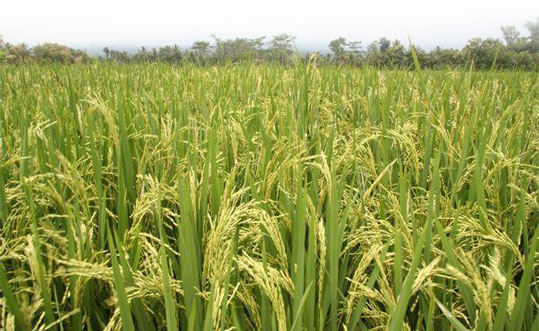Kuwaiti Farmer grow the Basmati Rice in Kuwait
 A Kuwaiti farmer has managed to grow basmati rice in Kuwait for the first time. Yusuf Al-Kirbani told KUNA, Kuwait News Agency, that despite tough conditions he has grown Indian basmati rice on his farm in the Al Wafra area.
A Kuwaiti farmer has managed to grow basmati rice in Kuwait for the first time. Yusuf Al-Kirbani told KUNA, Kuwait News Agency, that despite tough conditions he has grown Indian basmati rice on his farm in the Al Wafra area.
He said basmati requires heavy neutral soils like clay, clay loam and loamy, that are capable of holding water for longer periods, So he used cultivation basins without holes to hold water. He also attempted to produce black tomatoes and white strawberry.
*Basmati is a variety of long, slender grain aromatic rice which is traditionally from India and Pakistan. In 2014, India supplied 65 percent of the overseas basmati rice market. ‘Basmati’ derives from the Sanskrit word vasmati, meaning ‘fragrant’. It is believed to have been cultivated in the Indian subcontinent for centuries.
Kuwait News
- Events in Kuwait
- Prostitution by social media in Kuwait
- Plan to deport one million expats runs into fierce opposition
- Girl smashed the bottle on head of boy in mall
- Nepali ‘gay’ kills friend in Sabhan
- New Fuel Prices Announced 2017
- Minor Daughter impregnated by her Father – Authorities in dilemma over baby born
- Kuwaitization policy by replacing expats with Kuwaitis in PAHW, implemented.
- Famous female fashion designer jailed in Kuwait
- Suspects would be behind of “glass barriers” instead of “steel bars” in Kuwait
- Security raid at camps in Mahboula
- Change the timetables of some schools to control the traffic
- 3 Men and 4 Women arrested in Salmiya
- Three deported and 22 in custody
- Salmiya and Hawalli areas have started reducing the rent
- Revised Bus Fares from 1st January
- Expats will allow to own apartments in Kuwait
- Applying for new driving license after cancellation of old license
- Parent beats student in wrong identity
- New amendments to traffic rules
- Crack down on New Year parties

Comments (1)
Filed in: All • Expats in Kuwait • Info • Local News • News









Very interesting how technology makes it possible to grow rice in such hard climate conditions